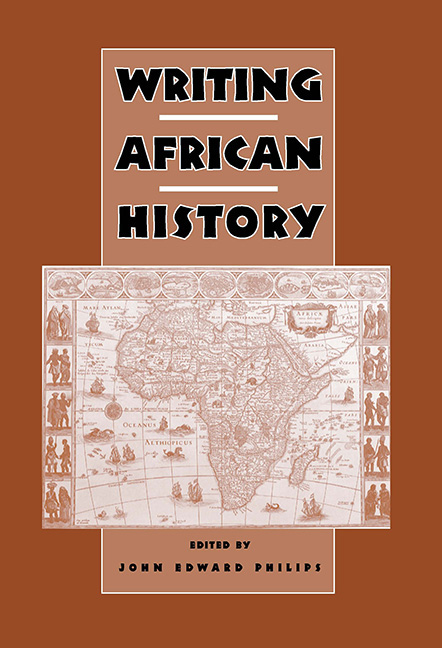Book contents
- Frontmatter
- Dedication
- Contents
- Acknowledgments
- Introduction
- Part I Background
- Part II Sources of Data
- Part III Perspectives on History
- 11 Data Collection and Interpretation in the Social History of Africa
- 12 African Economic History: Approaches to Research
- 13 Signs of Time, Shapes of Thought: The Contributions of Art History and Visual Culture to Historical Methods in Africa
- 14 Methodologies in Yorùbá Oral Historiography and Aesthetics
- 15 Local History in Post-Independent Africa
- 16 Africa and World-Systems Analysis: A Post-Nationalist Project?
- 17 “What Africa Has Given America”: African Continuities in the North American Diaspora
- 18 History and Memory
- 19 Writing About Women: Approaches to a Gendered Perspective in African History
- Part IV Conclusion
- Contributors
- Index
- Miscellaneous Endmatter
15 - Local History in Post-Independent Africa
from Part III - Perspectives on History
Published online by Cambridge University Press: 11 May 2017
- Frontmatter
- Dedication
- Contents
- Acknowledgments
- Introduction
- Part I Background
- Part II Sources of Data
- Part III Perspectives on History
- 11 Data Collection and Interpretation in the Social History of Africa
- 12 African Economic History: Approaches to Research
- 13 Signs of Time, Shapes of Thought: The Contributions of Art History and Visual Culture to Historical Methods in Africa
- 14 Methodologies in Yorùbá Oral Historiography and Aesthetics
- 15 Local History in Post-Independent Africa
- 16 Africa and World-Systems Analysis: A Post-Nationalist Project?
- 17 “What Africa Has Given America”: African Continuities in the North American Diaspora
- 18 History and Memory
- 19 Writing About Women: Approaches to a Gendered Perspective in African History
- Part IV Conclusion
- Contributors
- Index
- Miscellaneous Endmatter
Summary
The growth of local history in post-independent Africa has been phenomenal, particularly among minorities long ignored as historically insignificant (as evidenced in the lack of attention paid to their past). For example, in Nigeria alone the Zuru of Kebbi, the Moroa, Kagoro, the Ham, the Kataf of southern Kaduna, the Itsekiri and Urhobo of the Niger Delta, and the Okin Yoruba of Northeastern Yorubaland have, in the twentieth century, attempted to write their local histories. In all these cases, the attempts have been fully sponsored by ethnic unions and actively supported by the elite. Today almost every ethnic group once neglected in Nigeria's historical documentation has attempted to write its own local history. In most cases, the only available recorded history of the people's past had been that left behind by Europeans who got their information from colonial informers (often from hostile ethnic groups) who actively collaborated with the British to achieve their own objectives. Such cases, especially when tribal prejudice was at play, led to distortion of a people's history.
This chapter will first look at how the Atyap, a minority group in Southern Kaduna, Nigeria, has used available resources in writing its history and will then widen the topic to the general growth of local histories in post-independent Africa, the significance of this, and the obstacles faced.
The Atyap form part of the Nok Culture Complex in the upper Kaduna River valley. They speak a language in the Kwa group of the Benue-Congo language family. Since the 1970s they have wanted a local history text of their own. They made a bold attempt in 1981 when efforts by the Kataf Youth Christian Association resulted in the first Kataf History Conference, which brought together the academic world, local historians, and traditional leaders of the community. This mass participation, although hampered by a language barrier, was useful in eliciting relevant information.
The proceedings of that pioneering work, even though bound, could not be presented as an authentic and acceptable history of the people. Nonetheless, it laid a solid foundation for collection of the fairly reliable data that formed the background information that eventually led to the publication of A History of the Atyap. Also, identification of those within the community who had valuable facts about the people's past became possible.
- Type
- Chapter
- Information
- Writing African History , pp. 374 - 380Publisher: Boydell & BrewerPrint publication year: 2005

